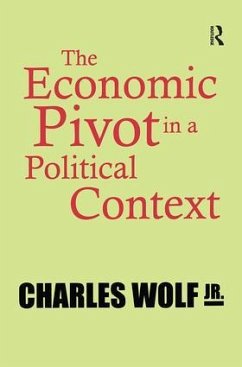The Economic Pivot in a Political Context
Herausgeber: Wolf, Jr.
The Economic Pivot in a Political Context
Herausgeber: Wolf, Jr.
- Broschiertes Buch
- Merkliste
- Auf die Merkliste
- Bewerten Bewerten
- Teilen
- Produkt teilen
- Produkterinnerung
- Produkterinnerung
When all too many so-called experts see things as they wish they were, Charles Wolf analyze facts to provide genuine insights into the past, present and future
Andere Kunden interessierten sich auch für
![Turkey's Pivot to Eurasia Turkey's Pivot to Eurasia]() Turkey's Pivot to Eurasia64,99 €
Turkey's Pivot to Eurasia64,99 €![Politics and the Internet in Comparative Context Politics and the Internet in Comparative Context]() Politics and the Internet in Comparative Context64,99 €
Politics and the Internet in Comparative Context64,99 €![Latin America and the Caribbean in the Global Context Latin America and the Caribbean in the Global Context]() Betty HorwitzLatin America and the Caribbean in the Global Context71,99 €
Betty HorwitzLatin America and the Caribbean in the Global Context71,99 €![The Public Sector Pivot The Public Sector Pivot]() Kaitlyn RentalaThe Public Sector Pivot17,99 €
Kaitlyn RentalaThe Public Sector Pivot17,99 €![US Foreign Policy in Context US Foreign Policy in Context]() Adam QuinnUS Foreign Policy in Context80,99 €
Adam QuinnUS Foreign Policy in Context80,99 €![Congress in Context Congress in Context]() John HaskellCongress in Context78,99 €
John HaskellCongress in Context78,99 €![Electoral Systems and Political Context Electoral Systems and Political Context]() Robert G. MoserElectoral Systems and Political Context27,99 €
Robert G. MoserElectoral Systems and Political Context27,99 €-
-
-
When all too many so-called experts see things as they wish they were, Charles Wolf analyze facts to provide genuine insights into the past, present and future
Hinweis: Dieser Artikel kann nur an eine deutsche Lieferadresse ausgeliefert werden.
Hinweis: Dieser Artikel kann nur an eine deutsche Lieferadresse ausgeliefert werden.
Produktdetails
- Produktdetails
- Verlag: Routledge
- Seitenzahl: 234
- Erscheinungstermin: 9. Februar 2018
- Englisch
- Abmessung: 229mm x 152mm x 13mm
- Gewicht: 346g
- ISBN-13: 9781138515765
- ISBN-10: 1138515760
- Artikelnr.: 57042826
- Herstellerkennzeichnung
- Libri GmbH
- Europaallee 1
- 36244 Bad Hersfeld
- gpsr@libri.de
- Verlag: Routledge
- Seitenzahl: 234
- Erscheinungstermin: 9. Februar 2018
- Englisch
- Abmessung: 229mm x 152mm x 13mm
- Gewicht: 346g
- ISBN-13: 9781138515765
- ISBN-10: 1138515760
- Artikelnr.: 57042826
- Herstellerkennzeichnung
- Libri GmbH
- Europaallee 1
- 36244 Bad Hersfeld
- gpsr@libri.de
Jr. Wolf
I: Economic Forecasts and the Changing Global Economy
1: Nonaccountability Among the Experts
2: The Ebb of Neo-Mercantilism
3: Pitfalls of Public Policy: Strategic Trade Policy and Industrial Policy
4: Glib Rhetoric, Loose Thinking
5: Taxes, Trade, and Growth
6: Global Competition for Long-Term Capital: Who Will Win?
7: What's Behind the Weak Dollar?
8: Who Really Needs a Country Anymore?
9: Why Asia Will Matter More Than Europe
10: Clintonomics versus Reaganomics
11: Social Capital and Economic Performance
12: "Downsizing," Corporate Responsibility, and the Trade-Off Between Efficiency and Equity
II: Economic Power and Military Power
13: Competing Priorities in the Post-Cold War Era
14: Military Power, Economic Power, and a Less Disorderly World
15: Economics and Security in Central Europe
16: Economic Instruments, Military Instruments, and National Power
17: Arms, Trade, and a Less Disorderly World
18: Gun Control at Home, Decontrol Abroad
19: Nixon's View of the World
20: Where the Disorderly World is Heading
III: The Economies of Japan and China
21: Dissecting the Japanese Problem with "Occam's Razor"
22: Resuming the Protracted U.S.-Japan Economic Debate
23: Clearing the Fog Over U.S.-Japan Economic Relations
24: The Strong Yen of a Weakened Economy
25: Sense and Nonsense About Dealing with Japan
26: China's Enlarged Economy
27: Asia's Rise Will Advance U.S. Prosperity
28: The United States and Japan: "Revisionism" Revisited
29: Rivalry and Disputes Among the Big Three
IV: Transforming the Russian and Ukrainian Economies
30: Transforming Command Economies into Market Economies: Problems, Solutions, Obstacles
31: The Ingredients of Transforming Command Economies
32: Democracy and Free Markets
33: Some Hopeful Signs amidst the Commonwealth's Economic Travails
34: Limited Optimism Rather Than Boundless Pessimism About the Russian Economy
35: Two are Better Than One
36: The Question of Soviet Aid
37: Aiding Russia and Ukraine
38: To Privatize, Randomize
39: Swapping Debt for Equity in Russia
1: Nonaccountability Among the Experts
2: The Ebb of Neo-Mercantilism
3: Pitfalls of Public Policy: Strategic Trade Policy and Industrial Policy
4: Glib Rhetoric, Loose Thinking
5: Taxes, Trade, and Growth
6: Global Competition for Long-Term Capital: Who Will Win?
7: What's Behind the Weak Dollar?
8: Who Really Needs a Country Anymore?
9: Why Asia Will Matter More Than Europe
10: Clintonomics versus Reaganomics
11: Social Capital and Economic Performance
12: "Downsizing," Corporate Responsibility, and the Trade-Off Between Efficiency and Equity
II: Economic Power and Military Power
13: Competing Priorities in the Post-Cold War Era
14: Military Power, Economic Power, and a Less Disorderly World
15: Economics and Security in Central Europe
16: Economic Instruments, Military Instruments, and National Power
17: Arms, Trade, and a Less Disorderly World
18: Gun Control at Home, Decontrol Abroad
19: Nixon's View of the World
20: Where the Disorderly World is Heading
III: The Economies of Japan and China
21: Dissecting the Japanese Problem with "Occam's Razor"
22: Resuming the Protracted U.S.-Japan Economic Debate
23: Clearing the Fog Over U.S.-Japan Economic Relations
24: The Strong Yen of a Weakened Economy
25: Sense and Nonsense About Dealing with Japan
26: China's Enlarged Economy
27: Asia's Rise Will Advance U.S. Prosperity
28: The United States and Japan: "Revisionism" Revisited
29: Rivalry and Disputes Among the Big Three
IV: Transforming the Russian and Ukrainian Economies
30: Transforming Command Economies into Market Economies: Problems, Solutions, Obstacles
31: The Ingredients of Transforming Command Economies
32: Democracy and Free Markets
33: Some Hopeful Signs amidst the Commonwealth's Economic Travails
34: Limited Optimism Rather Than Boundless Pessimism About the Russian Economy
35: Two are Better Than One
36: The Question of Soviet Aid
37: Aiding Russia and Ukraine
38: To Privatize, Randomize
39: Swapping Debt for Equity in Russia
I: Economic Forecasts and the Changing Global Economy
1: Nonaccountability Among the Experts
2: The Ebb of Neo-Mercantilism
3: Pitfalls of Public Policy: Strategic Trade Policy and Industrial Policy
4: Glib Rhetoric, Loose Thinking
5: Taxes, Trade, and Growth
6: Global Competition for Long-Term Capital: Who Will Win?
7: What's Behind the Weak Dollar?
8: Who Really Needs a Country Anymore?
9: Why Asia Will Matter More Than Europe
10: Clintonomics versus Reaganomics
11: Social Capital and Economic Performance
12: "Downsizing," Corporate Responsibility, and the Trade-Off Between Efficiency and Equity
II: Economic Power and Military Power
13: Competing Priorities in the Post-Cold War Era
14: Military Power, Economic Power, and a Less Disorderly World
15: Economics and Security in Central Europe
16: Economic Instruments, Military Instruments, and National Power
17: Arms, Trade, and a Less Disorderly World
18: Gun Control at Home, Decontrol Abroad
19: Nixon's View of the World
20: Where the Disorderly World is Heading
III: The Economies of Japan and China
21: Dissecting the Japanese Problem with "Occam's Razor"
22: Resuming the Protracted U.S.-Japan Economic Debate
23: Clearing the Fog Over U.S.-Japan Economic Relations
24: The Strong Yen of a Weakened Economy
25: Sense and Nonsense About Dealing with Japan
26: China's Enlarged Economy
27: Asia's Rise Will Advance U.S. Prosperity
28: The United States and Japan: "Revisionism" Revisited
29: Rivalry and Disputes Among the Big Three
IV: Transforming the Russian and Ukrainian Economies
30: Transforming Command Economies into Market Economies: Problems, Solutions, Obstacles
31: The Ingredients of Transforming Command Economies
32: Democracy and Free Markets
33: Some Hopeful Signs amidst the Commonwealth's Economic Travails
34: Limited Optimism Rather Than Boundless Pessimism About the Russian Economy
35: Two are Better Than One
36: The Question of Soviet Aid
37: Aiding Russia and Ukraine
38: To Privatize, Randomize
39: Swapping Debt for Equity in Russia
1: Nonaccountability Among the Experts
2: The Ebb of Neo-Mercantilism
3: Pitfalls of Public Policy: Strategic Trade Policy and Industrial Policy
4: Glib Rhetoric, Loose Thinking
5: Taxes, Trade, and Growth
6: Global Competition for Long-Term Capital: Who Will Win?
7: What's Behind the Weak Dollar?
8: Who Really Needs a Country Anymore?
9: Why Asia Will Matter More Than Europe
10: Clintonomics versus Reaganomics
11: Social Capital and Economic Performance
12: "Downsizing," Corporate Responsibility, and the Trade-Off Between Efficiency and Equity
II: Economic Power and Military Power
13: Competing Priorities in the Post-Cold War Era
14: Military Power, Economic Power, and a Less Disorderly World
15: Economics and Security in Central Europe
16: Economic Instruments, Military Instruments, and National Power
17: Arms, Trade, and a Less Disorderly World
18: Gun Control at Home, Decontrol Abroad
19: Nixon's View of the World
20: Where the Disorderly World is Heading
III: The Economies of Japan and China
21: Dissecting the Japanese Problem with "Occam's Razor"
22: Resuming the Protracted U.S.-Japan Economic Debate
23: Clearing the Fog Over U.S.-Japan Economic Relations
24: The Strong Yen of a Weakened Economy
25: Sense and Nonsense About Dealing with Japan
26: China's Enlarged Economy
27: Asia's Rise Will Advance U.S. Prosperity
28: The United States and Japan: "Revisionism" Revisited
29: Rivalry and Disputes Among the Big Three
IV: Transforming the Russian and Ukrainian Economies
30: Transforming Command Economies into Market Economies: Problems, Solutions, Obstacles
31: The Ingredients of Transforming Command Economies
32: Democracy and Free Markets
33: Some Hopeful Signs amidst the Commonwealth's Economic Travails
34: Limited Optimism Rather Than Boundless Pessimism About the Russian Economy
35: Two are Better Than One
36: The Question of Soviet Aid
37: Aiding Russia and Ukraine
38: To Privatize, Randomize
39: Swapping Debt for Equity in Russia








